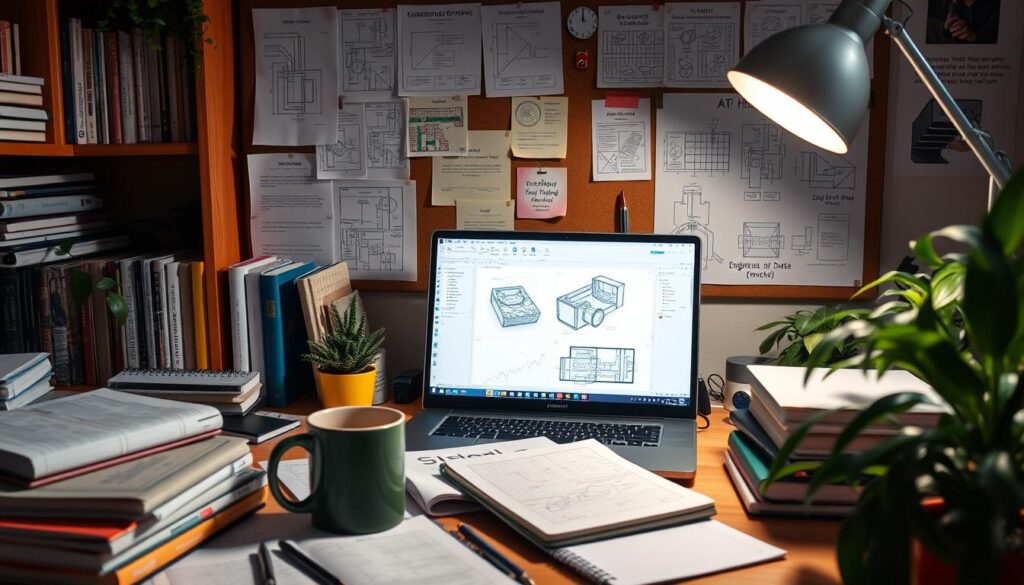Starting your engineering journey can feel overwhelming. But, with the right mindset and strategies, you can make it rewarding. I remember the mix of excitement and fear when I first started. It was tough to grasp the basics and keep up with the tough classes. Essential Tips for Beginning Engineering Students
But, with hard work and a desire to learn, I got it. I learned to solve problems and appreciate engineering’s challenges. This experience helped me grow and understand engineering better.
In this article, we’ll cover important steps for a strong start in engineering. You’ll learn about mastering math and science, and how to think critically. These tips will help you face challenges with confidence and determination. Essential Tips for Beginning Engineering Students

Key Takeaways
- Understand the importance of foundational engineering concepts
- Develop strong mathematical and scientific problem-solving skills
- Learn to effectively manage your time and academic workload
- Build critical thinking and analytical abilities for engineering design
- Leverage campus resources and support systems to maximize success
Mastering Engineering Fundamentals: Your First Steps
As a new engineering student, you’ll explore key concepts that are the foundation of your studies. This section will help you learn the math, physics, and drawing skills needed for success.
Understanding Core Mathematical Concepts
Math is the language of engineering. You need to understand basic math core concepts. Focus on calculus, linear algebra, and differential equations. Practice these to improve your problem-solving skills and face engineering challenges confidently.Essential Tips for Beginning Engineering Students
Building Strong Physics Foundations
Strong physics foundations are essential for engineering. Learn mechanics, thermodynamics, electromagnetism, and more. Experiments and problem-solving will deepen your knowledge and prepare you for writing and engineering design tasks.Essential Tips for Beginning Engineering Students
Developing Technical Drawing Skills
- Technical drawing is key for engineers. Spend time learning CAD software like AutoCAD or SolidWorks.
- Learn to read and create technical drawings, blueprints, and 3D models. This will help share your engineering design ideas clearly.
- Pay attention to detail and precision. These skills are vital for your future work.
| Skill | Importance | Key Concepts |
|---|---|---|
| Mathematical Foundations | Vital for understanding and applying engineering principles | Calculus, Linear Algebra, Differential Equations |
| Physics Comprehension | Provides the scientific basis for engineering applications | Mechanics, Thermodynamics, Electromagnetism |
| Technical Drawing | Enables effective communication of engineering design ideas | CAD software, Technical Schematics, 3D Modeling |
Mastering these engineering basics sets you up for success. With a solid grasp of math, physics, and drawing, you’re ready to face your first year and beyond.Essential Tips for Beginning Engineering Students
Navigating Your First Year: Curriculum and Courses
Starting your engineering journey means diving into the first-year curriculum and introductory courses. These are the building blocks for your success. They help you grasp the core concepts in your field.
The first year usually includes prerequisite courses in math and science. You’ll learn about calculus, physics, and chemistry. These classes prepare you for more challenging engineering subjects.
You’ll also take technical drawing or computer-aided design (CAD) courses. These teach you vital skills for engineering design and visualization. They give you the tools and knowledge needed for your studies.
It’s key to work with your academic advisor during your first year. They help you choose the right courses and meet prerequisites. They also guide you on managing your workload and finding academic support on campus.Essential Tips for Beginning Engineering Students

The first year of your engineering education is crucial. By understanding the key courses and using your academic support, you’ll excel in your program. This sets you up for a successful career.
Building Essential Problem-Solving and Critical Thinking Skills
As an engineering student, it’s key to develop strong problem-solving and critical thinking skills. These abilities help you tackle complex technical challenges. They also make you adaptable in a changing field.
Applying Systematic Problem-Solving Methods
Learning a systematic problem-solving approach is vital for engineering. It means breaking down problems into smaller steps. You gather data and use tools to find solutions.
By improving your problem-solving skills, you’re ready for many engineering challenges.
Developing Analytical Thinking Strategies
Critical thinking is crucial for engineering students. It’s about analyzing information objectively and considering different views. This helps you make informed decisions and find creative solutions.
Mastering Engineering Design Principles
Engineering design is at its core. It requires understanding technical skills and engineering design principles. You use math, physics, and engineering basics to design and test products.
Mastering these principles lets you solve real-world engineering problems. It helps you contribute to new technologies.Essential Tips for Beginning Engineering Students
| Skill | Description | Importance |
|---|---|---|
| Problem-Solving | Systematic approach to breaking down and solving complex issues | Enables engineers to tackle a wide range of technical challenges effectively |
| Critical Thinking | Ability to analyze information objectively and evaluate multiple perspectives | Supports sound decision-making and innovative problem-solving |
| Technical Skills | Proficiency in engineering fundamentals, such as mathematics, physics, and design principles | Provides the foundation for creating and evaluating engineering solutions |
“The essence of engineering is problem-solving, and the essence of problem-solving is creativity.” – Gordon H. Bower, American psychologistEssential Tips for Beginning Engineering Students
Maximizing Your Academic Success Through Resources
As a new engineering student, you have many resources to help you succeed. These tools can help you reach your full potential and start a successful career.Essential Tips for Beginning Engineering Students
Collaborative Learning: The Power of Study Groups
Working with your classmates is a great resource. Joining a study group lets you share ideas, solve tough problems, and learn teamwork.Essential Tips for Beginning Engineering Students
Mentorship Programs: Guidance from Experienced Professionals
Many schools have mentorship programs. These pair you with older students or professionals. They can guide you through school, help find internships, and plan your career.
Research Opportunities: Hands-On Learning and Collaboration
Doing research projects can teach you a lot and give you practical experience. You’ll work with professors and other students. This builds teamwork and project management skills.
Career Guidance Services: Preparing for the Future
The career services office at your school is very helpful. They assist with resumes, interviews, networking, and finding jobs. This helps you move from student to professional.Essential Tips for Beginning Engineering Students
Using all these resources can help you succeed in engineering. It sets you up for a rewarding career.

| Resource | Benefits |
|---|---|
| Study Groups | Collaborative learning, peer support, teamwork development |
| Mentorship Programs | Guidance from experienced professionals, career planning |
| Research Opportunities | Hands-on learning, collaboration, project management skills |
| Career Guidance Services | Resume building, interview preparation, networking, job search assistance |
Conclusion
Starting your engineering journey? Success comes from understanding the basics, solving problems well, and using all the resources you can. Learning the core math and science will give you a strong base. This base will help you in your studies and career.Essential Tips for Beginning Engineering Students
Being good at critical thinking and analysis is key in engineering. Use systematic ways to solve problems. This will help you face tough challenges with confidence. Learning to design will also help you come up with new and useful solutions.Essential Tips for Beginning Engineering Students
But, your success isn’t just about being good at math and science. Use all the help you can get, like from teachers and campus services. Stay open to learning, see challenges as chances to grow. With this mindset, you’ll do great in your engineering studies.
FAQ
What are the key engineering fundamentals I need to master as a beginning student?
As a new engineering student, you’ll need to grasp core math concepts and physics. You also need to get good at technical drawing. These basics are key for doing well in your first courses and setting a strong foundation for your studies.
What can I expect from the typical first-year engineering curriculum?
The first year of engineering introduces you to the field. You’ll take courses on calculus, physics, engineering design, and programming. Make sure to check the course requirements and plan your schedule well to smoothly start your engineering studies.
How can I develop effective problem-solving and critical thinking skills?
To succeed in engineering, you need to improve your problem-solving and critical thinking. Focus on using systematic methods, developing analytical thinking, and mastering engineering design basics. These skills will help you solve complex problems in your studies and future career.
What resources are available to help me succeed as a beginning engineering student?
As a new engineering student, you have many resources to help you succeed. These include study groups, mentorship, research chances, and career advice. Using these resources can help you learn teamwork, gain experience, and explore engineering careers.



